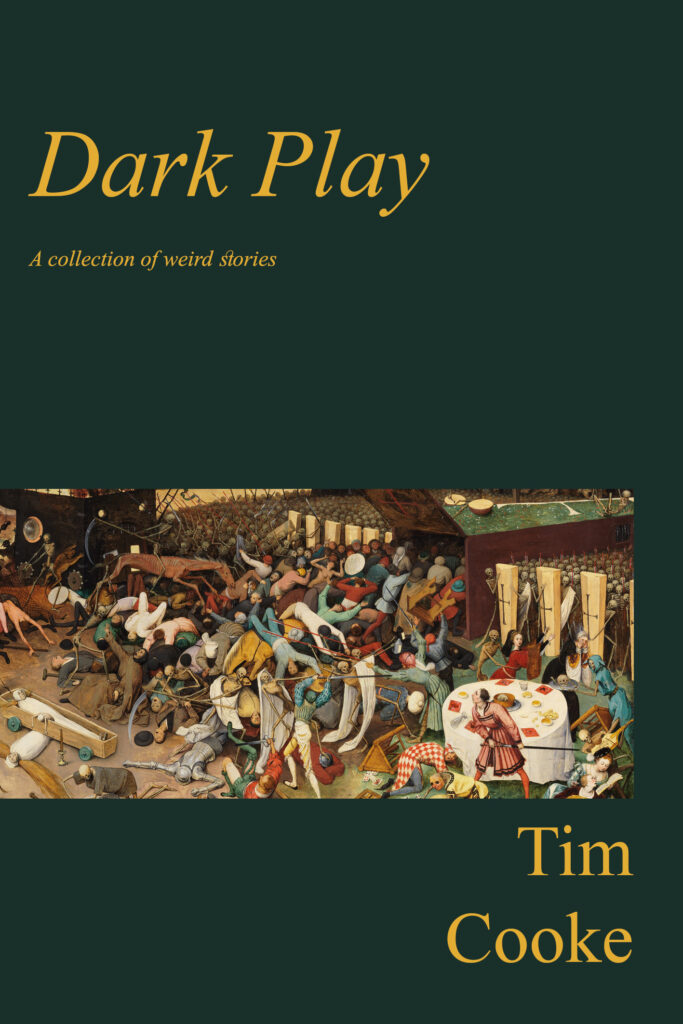Book Review – November 2024
I woke to thud and a crack, a small face ricocheting away from the glass. The features – much like my own – creased into a familiar frown. A spurt of blood spilled from a crevice in the brow, running in thick lines down to the chin.

Dark Play is a collection of linked short stories by Tim Cooke, each one featuring a father and young daughter living in an isolated farmhouse on a Welsh hillside. Cooke’s stories were inspired by the concept of ‘dark play’ developed by the American professor of drama, Richard Schechner. In Schechner’s dark play some or all of the participants are not aware they are taking part in a game and, implicitly, they are unable to consent to their participation.
Play is, indeed, at the heart of this collection. The girl, Nia, does not appear to have any friends nor is it ever mentioned that she attends a school. But she has a fertile imagination and is well-versed in the art of playing alone. But perhaps never completely on her own. Her father, often an observer, is at other times, some of the stories seem to suggest, an active participant. But the real connection in Nia’s play, and the channel whereby more sinister elements seem to enter her games, is with the remote landscape all about them and the stories of the people who lived and died there. Within the orbit her play, and spilling out of these games, the landscape and its tales seem to come to life.
Reality and imaginative play are tumbled together. Are Nia’s stories real and, indeed, is her dad a reliable narrator? We are offered no easy answers, but palpable feelings of dread tighten their grip as each tale unfolds. Driving home after a pub meal in the opening story, The Judgement, Nia asks her father about the ladies she saw while he went to the toilet as they were leaving. They were in a red room in the pub with candles, flowers and a funny smell: The woman with brown teeth asked me about you. Do you think she knows that we live up here? Later, in The Visitor, on a stormy evening, someone unexpected really does come to their door. Dad had just entertained Nia with a strange story of a persecuted witch who wandered the local hills looking for her now demolished cottage. She would appear to people in a variety of disguises, so the young male hiker, soaked to the skin and asking to use the phone, immediately raised Nia’s suspicions. Then, in a later story, a game which starts as a silly prank leads to that worst nightmare of any parent, a missing child.
The stories, some of them very short, are linked and all centre on Nia and her father. But they do not follow a linear arc; nor does the beginning of one story pick-up on the ending of the previous one. Instead the reader is left to puzzle how the various episodes fit together. Perhaps they follow a cyclical pattern or even, in a nightmarish way, they are locked in a continuous loop.
Other characters appear in some of the stories. Dad’s sister and her baby, in a story called The Conversion, come to visit. But they somehow seem to be characters within the framework of the underlying game rather than individuals acting with their own agency. Nia’s mother is a tangible absence throughout the stories. We are led to sense that something has happened, but we have no idea what this might be.
Then in the final story, Mother, she is suddenly there alongside Nia and Dad helping her husband to host a barbecue for friends. But what should be a carefree, relaxing afternoon becomes steadily more unsettling and the very landscape around them seems to exude portents of menace. As a moment of real horror approaches the reader becomes aware of a malign influence reaching both backwards and forwards through time.
Tim Cooke has set his collection of ‘weird’ stories in the land which gave birth to a much older collection of tales, The Mabinogion. His great achivement with Dark Play is to take a contemporary narrative and ground it in a much older, storied landscape. Past tragedies, injustices and pain are alluded to and, through Cooke’s stories, a lingering darkness soaks through into the present day. A remarkable feat in just 67 pages.
Tim Cooke
 Tim Cooke is a teacher, writer and creative writing PhD student. He was the winner of the New Welsh Writing Awards 2022: Rheidol Prize for Prose with a Welsh Theme or Setting for his blended nonfiction book, River.
Tim Cooke is a teacher, writer and creative writing PhD student. He was the winner of the New Welsh Writing Awards 2022: Rheidol Prize for Prose with a Welsh Theme or Setting for his blended nonfiction book, River.
